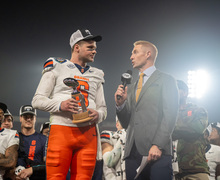Anders compared to Bobby Knight
Her win-loss record and championships can go toe-to-toe with John Wooden. Her old-school teaching philosophy is an advertised sweater away from Bobby Knight. And her departures and returns to the professional game are Michael Jordan-esque.
But Beth Anders isn’t a national sports icon like her basketball parallels. She’s the most notable figure in field hockey, a game that is given major-sport status internationally.
Anders is the head coach at Old Dominion. Today at 3 p.m., Syracuse faces Michigan in Ann Arbor, Mich. On Sunday, Syracuse faces ODU – and Anders – at 1 p.m. In 22 years of coaching, Anders has built a reputation as a hard-nosed, old-school coach: the Bobby Knight of field hockey.
‘Some people are scared of her,’ Syracuse head coach Kathleen Parker said. ‘People don’t think she’s a very good people person.’
But as a coach, Anders has put her stamp on the game at the collegiate ranks. The dynasty she has created at Old Dominion ranks right alongside the likes of Wooden’s at UCLA, the 1960s Boston Celtics and Jordan’s Chicago Bulls.
Anders has won nine national titles at ODU. Since joining the Colonial Athletic Association in 1991, ODU has captured the league crown 11 of 12 years. Starting with a victory over North Carolina in 1990, Old Dominion proceeded to win 66 consecutive games, which included three straight national titles. The Monarchs had another sensational string – 58 straight wins – that was snapped in 2003.
‘She’s a bit of a visionary,’ said Shelly Behrens, a goalie under Anders from 1984-88. ‘She looks at a team and sees how good they can be. She facilitates them to be better than you think you can be. No one wants to win more than Beth. Trust me.’
It doesn’t take an ODU player to see that.
Anders’ fiery personality attracts everyone’s attention. But it often takes an insider to understand what lies beneath the rugged exterior. The attention to detail, the willingness to teach every facet of the game and the ability to get her players to buy into the system.
‘The game has not passed me by,’ Anders said. ‘But I am old school. There’s nothing wrong with that. The teaching is there. The fundamentals are there. I think old school is a positive thing.
‘I think there’s a lot of things about Bobby Knight that I absolutely do respect, but I’m not anybody else. I’m emotional, passionate and I prepare, which means I teach. I’m not a showman.’
Unfortunately, there are people in the sport who don’t see that, but only see her explosive personality.
‘If you judge her based on that impression,’ Behrens said, ‘you’re missing out on a great person. The players at ODU know what they’re getting in to. When I played, people wanted to beat you, but also wanted to be like you.’
Practically all ODU players stay in school four years. The number of complaints shrinks when you win. There are no bad feelings upon graduating. Three of Anders’ four assistant coaches are former players. And she has a good relationship with her opposing coaches.
‘You can always learn something when you work with Beth or compete against her,’ said Ange Bradley, coach of the Richmond Spiders. ‘She’s worth two to three players on the field.’
Before Anders prowled the sidelines, she was close to that comparison as the top goal-scorer for the U.S. Olympic team. In 1980 – it was the first year field hockey was an Olympic sport – the Americans boycotted the Moscow Games. Four years later, as a corner-striker, she and her teammates won the bronze medal.
In the five games played, Anders was responsible for eight of the nine goals scored. Her shots were clocked at 90 mph.
But she had been a member of the U.S. team since 1969. She put down her stick to help develop college players at ODU. After she left, the U.S. team finished eighth in the 1988 Olympics, then failed to qualify in 1992, 2000 and 2004. The team was granted automatic entrance into the 1996 Games in Atlanta as the host. It finished fifth.
Even her return in 2004 as a coach failed to turn the U.S. team around. The United States finished sixth in the qualifying round and didn’t even reach Athens.
Anders blamed the ‘player-driven’ structure for the downfall of American field hockey in an interview with the Virginian-Pilot earlier this year.
‘Being good is not easy,’ she told the Pilot. ‘The coach needs to be able to set demands that the athletes try to meet. But these athletes say what they want to do.’
Anders’ dream of turning her country into a top three program with the likes of Australia and the Netherlands may have faded away. She resigned as the U.S. team’s coach, not to the surprise of her bosses.
‘She was basically on loan to us from ODU,’ said Howard Thomas, publicist for USA Field Hockey.
Anders also told Robinson leaving the U.S. team wasn’t difficult, but relinquishing her dream was.
‘USA field hockey means a lot to me,’ she said. ‘It always has. This could be a good job if they change the structure. If they’re patient and allow the coach to drive the program, this could be a very good team in eight years.’
She returns to Old Dominion for the 2004 season after her leave of absence from the team in 2003. At the collegiate level, at least, it’s hard to argue with nine national titles and a 429-64-7 career record.
‘In my opinion,’ Parker said, ‘Beth Anders is probably the best hockey mind in this country. I have the utmost respect for her. As far as I’m concerned, whatever she says is right. It’s law.’
Published on September 9, 2004 at 12:00 pm





